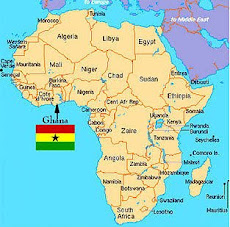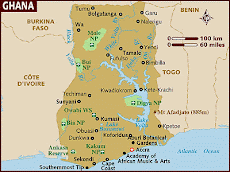This week, we finally completed the evaluation report for the Education Service. We sent a copy to Dora Amoah-Bentil, the person responsible for VSO’s education programme in Ghana. In response, she emailed, “Don’t leave Ghana; stay forever” - so we think she is fairly satisfied with the report.
We took Joanne, the new teacher support officer, on a visit to two schools earlier in the week. These schools are located in the village of Nakore, approximately 8 miles from our house. The journey to Nakore involves a cycle ride along a beautiful dirt-track road, surrounded by typical savanna vegetation. We always meet local women along this route, and it is a reminder of the harshness of the lives they lead. It was approximately 7.00 a.m. when we were on this road, and the women below were doing what they do every day i.e. collecting heavy loads of firewood, having already walked really long distances to collect water.
.jpg)
.jpg)
The purpose of our visit to Nakore Junior Secondary School was to use 2 battery-operated lap top computers to show the teachers and students some basic IT, because the school has no electricity and no computers. Most of the teachers have never used a computer and most of the students have never seen a computer. They use textbooks and the blackboard to learn about IT, and they have to take an examination in the subject.
.jpg)
We also visited Nakore Primary School. This is a very disadvantaged school – with an excellent headteacher, who is very enterprising. For example, he has worked with the teachers and some of the students to fence off an area of ground to grow maize and okra. This will be planted when the rainy season starts and the produce will be sold at the market, in order to raise money for the school. The school has no electricity, water or toilets. It is also short of classroom space. The kindergarten class has no classroom at all, and lessons take place under a mango tree. In many ways, this is healthier than being crowded into a classroom, but when the rainy season arrives, they have nowhere to be taught. They either stay at home or they all squash into the headteacher’s office.
.jpg)
The classrooms are all overcrowded. In many classrooms, there are insufficient desks and chairs for the students. This means that most of the class has to sit on the floor for the whole day.
.jpg)
.jpg)
.jpg)
.jpg)
As in other schools, students have the opportunity to buy food from local people during the break time.
.jpg)
Despite the lack of resources, the teachers are really committed and optimistic, and the students are always very welcoming. They rarely see a white person and therefore they make a great fuss of us when we visit. When we leave the school, the kindergarten children always leave their mango tree classroom and accompany us back along the dirt path to the main road in the village – pushing and pulling our bikes as we go.
.jpg)
Another highlight of this week has been a training session with the teachers at a local primary school. They have to teach the solar system to year 4 students, and they find this a difficult topic – hence the request to us to run the session for them. Everyone had a great laugh, acting as the sun, moon and earth, rotating around each other. The poor moon got a little dizzy! It was an ideal opportunity to demonstrate that resources can be made very easily from waste paper and cardboard – and that the students will learn more if they are actively involved in the lesson.
.jpg)
We had a great session with the circuit supervisors this week. They regularly visit schools to provide both support and monitoring. It is therefore important they are familiar with the work that we have done with headteachers in our workshops, so that they can continue the dialogue, when they visit their schools. The picture shows 6 of the 8 circuit supervisors and their line manager, who is one of 3 assistant directors of education.
.jpg)
Saturday 6th March is Independence Day in Ghana and this year, it celebrates 53 years of independence. Of course, there has been a wide range of celebratory events throughout Ghana. In Wa, we attended the celebrations at the local Jubilee Park. The guest of honour was the Governor of the southern region of Burkina Faso, pictured in the centre below, alongside the regional minister and chief executive of the Upper West region.
.jpg)
The Governor reminded us in his speech that the tribal groups of Northern Ghana and Southern Burkina Faso are the same people, divided by colonial borders
.jpg)
Many of the schools with whom we have worked were represented at the marching competition. We took a movie of the event, but the speed of our modem will only allow us to post some still photographs. The movie will come home with us.
.jpg)
.jpg)
Many of the local schools do a march past the guests of honour, as part of a competition. The marching started at 07.00 in order to avoid the heat of the day. The winning primary group is pictured below.
.jpg)
Many of the schools with whom we have worked were represented at the marching competition. We took a movie of the event, but the speed of our modem will only allow us to post some still photographs. The movie will come home with us.
.jpg)
.jpg)


